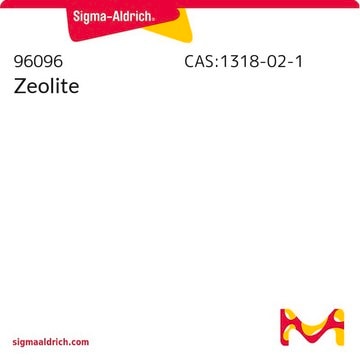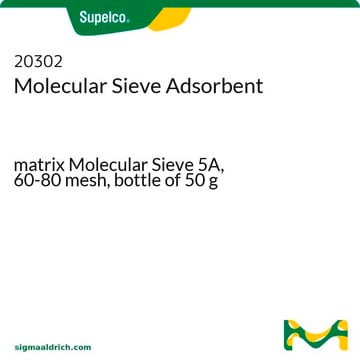MX1583L
Molecular Sieve, Type 4A
bead size 8-12 mesh
Synonym(s):
Molecular Sieve
Sign Into View Organizational & Contract Pricing
All Photos(1)
About This Item
UNSPSC Code:
23201100
Recommended Products
form
beads
Quality Level
bead size
8-12 mesh
color
tan
particle size
4-8 mesh (>=80%)
shipped in
ambient
storage temp.
room temp
General description
Molecular Sieve, Type 4A is an alkali metal aluminosilicate with a type 4A structure. It is used in the adsorption process to selectively adsorb molecules with an effective diameter <4Å and excludes molecules with an effective diameter >4Å.
Application
Molecular Sieve, Type 4A can be used:
- In regenerable drying systems to remove water vapor or contaminants.
- In drying saturated hydrocarbon streams and natural gas drying.
- To remove traces of water from various solvents (methanol, ethanol, acetone, DMSO, 1-butanol, 1-hexanol, and 1-octanol).
- In refrigerant drying.
Analysis Note
Color: Tan
Form: Beads
Identification (sodium): To pass test
Mesh size (8-12): 80% min
Form: Beads
Identification (sodium): To pass test
Mesh size (8-12): 80% min
Signal Word
Danger
Hazard Statements
Precautionary Statements
Hazard Classifications
Eye Dam. 1 - Skin Corr. 1B
Storage Class Code
8B - Non-combustible corrosive hazardous materials
WGK
WGK 1
Flash Point(F)
Not applicable
Flash Point(C)
Not applicable
Certificates of Analysis (COA)
Search for Certificates of Analysis (COA) by entering the products Lot/Batch Number. Lot and Batch Numbers can be found on a product’s label following the words ‘Lot’ or ‘Batch’.
Already Own This Product?
Find documentation for the products that you have recently purchased in the Document Library.
Study of intermolecular interaction in dimethylsulphoxide+ 1-alkanols (1-butanol, 1-hexanol, 1-octanol) at 303.15 K
Ali A, et al.
Physics and Chemistry of Liquids, 38(4), 459-473 (2000)
A study of the dehydration process of natural gas in Iraqi North Gas Company and the treatment methods of molecular sieve problems
Thesis (2012)
Electron microscopy of filamentous fungi
O?Connell RJ, et al.
Molecular and cell biology of filamentous fungi: a practical approach, 175-208 (2001)
Our team of scientists has experience in all areas of research including Life Science, Material Science, Chemical Synthesis, Chromatography, Analytical and many others.
Contact Technical Service







